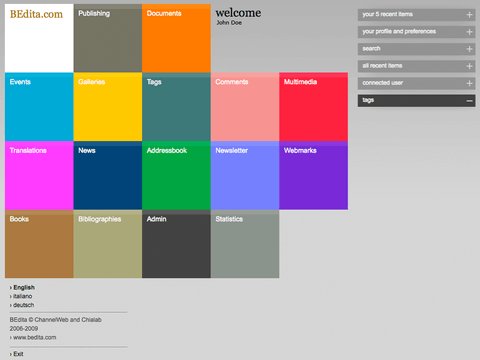BEdita
BEdita is an open source web development framework that features a Content Management System (CMS) out-of-the-box.
 | |
| Developer(s) | ChannelWeb srl / Chialab srl |
|---|---|
| Stable release | 3.3 "[1]
/ 28 February 2014 |
| Repository | |
| Written in | PHP |
| Operating system | Any |
| Platform | Cross-platform |
| Available in | English, Italian, German |
| Type | Content Management System & Web development framework |
| License | AGPLv3 |
| Website | www.bedita.com |
Current version is 3.1.5, released on 5 March 2012 under Affero General Public License version 3.
A preview and "unstable" version is also available: 3.2.beta populus, released on 5 March 2012 under the same GPL license.
BEdita is built upon the PHP development framework CakePHP.
Features
BEdita is both a content management system and a web development framework.
In the words of the authors, BEdita is a "modular framework that features a back-end Content Management System out-of-the-box".[2]
Bedita as a Framework

BEdita is built upon the well-known PHP development framework CakePHP: as a framework itself, BEdita actually extends CakePHP adding many features through more controllers and helpers and the Smarty templating engine. It also combines some presentation technologies, such as JQuery, with the aim to supply a set of ready to use tools.
From CakePHP BEdita derives the Model–view–controller paradigm: the multi-tier architecture assures the separation of data modelling, data flow/control and its visual presentation. Inside BEdita every information is stored in an object oriented manner. Upon this abstraction, the developer can build as many custom relations as needed by the project.
Bedita as a CMS

BEdita is also a complete content management system, since it already comes with a multi-language back office application, able to manage several kinds of data: the CMS presents a number of modules, each related to a type of content. It is able to handle documents, multimedia objects and galleries, events, news, address books, blogs, bibliographies, newsletters and more out of the box.
All this content is managed in multiple languages, geo-localized and organized through different strategies: hierarchic tree, custom categories and tags.
Releases
A brief history
For major release 3, BEdita has been rewritten from the ground up: all the previous versions were not publicly available under an open source license.
The very first public release of a version 3 "beta" took place in May 2009. On 17 November 2009 a stable version of BEdita – 3.0 codename Betula – was released under Affero General Public License version 3, freely downloadable on the official web site www.bedita.com and some common open-source online networks (Sourceforge, Freshmeat or Ohloh).
BEdita was created and is currently developed by two Italian companies, ChannelWeb srl and Chialab srl.
List of public official releases
| Versione | Code Name | Data | Note |
|---|---|---|---|
| 3.0.beta2 | NA | 27 May 2009 | first public release |
| 3.0.beta3 | NA | 1 August 2009 | |
| 3.0 RC | Alnus | 1 September 2009 | |
| 3.0 | Betula | 17 November 2009 | first official stable release |
| 3.01 | Betula | 12 January 2010 | stable release (bug fixes and minor updates) |
| 3.1.alpha | Ulmus | 5 May 2010 | unstable alpha release (bug fixes and new features) |
| 3.1.beta | Ulmus | 9 July 2010 | unstable beta release (bug fixes and new features) |
| 3.1.RC | Ulmus | 20 August 2010 | unstable RC release (bug fixes and new features) |
| 3.1 | Ulmus | 7 December 2010 | stable official release (bug fixes and new features) |
| 3.1.1 | Ulmus | 1 February 2011 | stable official release (bug fixes and new features) |
| 3.1.2 | Ulmus | 1 February 2011 | stable official release (bug fixes and new features) |
| 3.1.3 | Ulmus | 16 June 2011 | stable official release (bug fixes and new features) |
| 3.1.4 | Ulmus | 31 October 2011 | stable official release (bug fixes and new features) |
| 3.1.5 | Ulmus | 5 March 2012 | stable official release (bug fixes and new features) |
| 3.2.beta | Populus | 5 March 2012 | unstable beta release (bug fixes and new features) |
See also
- Free Software licensing
- List of AGPL web applications